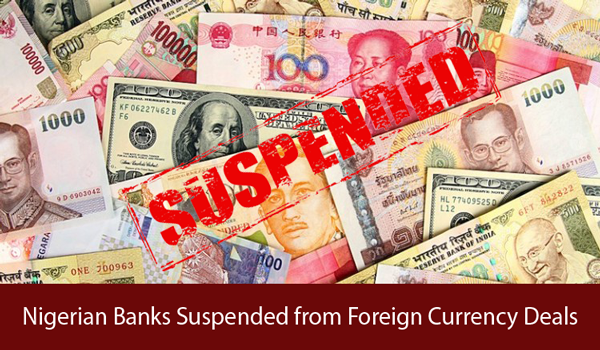Nine Nigerian banks have been suspended from foreign currency transactions due to defaulting on debts owed to the Nigerian government. The amount involved, and owned between the nine banks, is said to be $2.1 billion. The nine banks are apparently claimed to be withholding this sum that belongs to the state owned oil company.

In an attempt to reduce corruption in Nigeria, President Muhammadu Buhari ordered last year that all state accounts be merged into one single Nigerian Central Bank account. President Buhari estimated last year that government officials had stolen around $150 billion over the previous 10 years. This was easy to do because the government had no idea how many bank accounts were held by each ministry, and with which banks.
His solution was to centralize all government accounts into the Central Bank of Nigeria, and out of the hands of individual officials. To achieve this, all monies due to government bodies had to be paid into this central account. A deadline was given for this to be done, yet a year after the expiration of the deadline, it has still not been completed.
Nine banks have so far failed to make the transfer. These are: Diamond Bank, Fidelity Bank, First Bank, First City Monument Bank, Heritage Bank, Keystone Bank, Skye Bank, Sterling Bank and United Bank for Africa.
Because of this policy, these and most other commercial banks have suffered. This is because government agencies are no longer dealing with them. The smaller banks have suffered most. The failure of these nine banks to adhere to the government order means that importers and exporters who use any of these banks will also suffer. That is because they can no longer access any of their accounts holding foreign currencies. The Nigerian government has applied a complete foreign currency trade ban involving these banks.
A major issue with these payments is the low oil price. Oil is responsible for most of Nigeria’s foreign currency income. While oil prices remain low, many banks are unable to find the funds to meet this transfer. They cannot pay what they owe to the government oil company, particularly the smaller Nigerian banks. It is not that they are refusing payment, only that they do not have the funds to do so.
Each bank will be freed from the ban as it pays what it is due, and is also likely to have to pay a non-compliance fine. The ban will almost certainly have a significant effect on each of the banks involved. The problem started when the Nigerian National Petroleum Corporation (NNPC) complained to President Buhari that money owed had not been paid.
While his action in containing all government banking within the Central Bank of Nigeria is understandable, it seems as if the cure is causing more problems for the banks than the corruption appeared to.